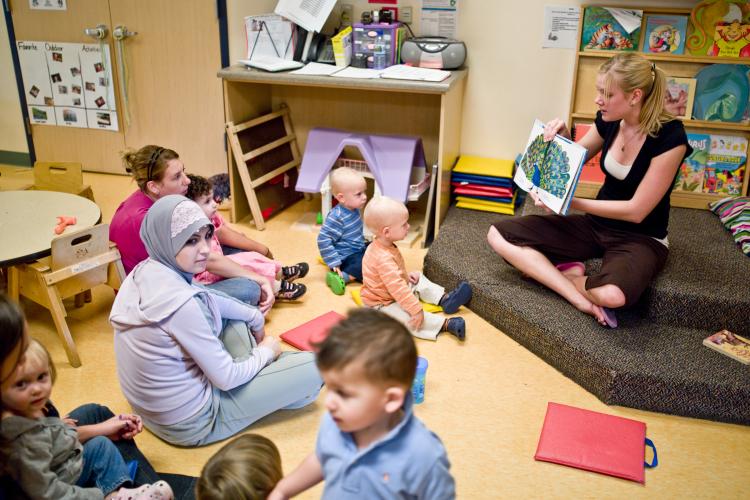Early Childhood (Level-Based)
The Early Childhood Education with Elementary Certification Program is designed for those intending to work with children, birth through 5th grade.
Early childhood elementary teachers are a unique group of educators who guide young learners during some of their most formative years. This major will prepare you to be a classroom teacher for children ages 0-8, with a unique academic program that emphasizes social constructivism and Reggio Emilia philosophies.
The Early Childhood Endorsement will enable you to teach in either a general early childhood education or special education classroom. Plus, graduates earn both a bachelor’s degree and faculty recommendation for the Michigan Elementary Standard Certificate.
The Michigan Department of Education (MDE) has revised Michigan’s teacher certification structure into 6 grade bands. CEHHS has submitted program proposals for our Birth through Kindergarten (B–K), Prekindergarten through Grade 3 (Pre-K–3), and Grades 3–6 grade band programs to the MDE. In addition, these same programs are working through the internal university curriculum approval process. Once approved, students will be able to apply for admission to these grade band programs starting in the Fall of 2022. Current elementary-certification students, and those admitted prior to Fall 2022, will have the opportunity to meet with an academic advisor to determine if they should remain in the current certification program or switch to a new grade band program.

What will I Learn?
- Candidates for certification will be capable in their content specialty areas.
- Candidates for certification will be capable users of pedagogical knowledge.
- Candidates for certification will be reflective about their practice.
Visit the University Catalog to learn more about required coursework for the Elementary Education - Early Childhood major and the requirements for the Michigan Elementary Standard Teaching Certificate.
Philosophy of UM-Dearborn Early Childhood Programs
The Early Childhood Education (ECE) programs are guided by the philosophy, objectives and standards promulgated by the National Association for the Education of Young Children (NAEYC) as well as those positions taken by the National Association of Early Childhood Educators (NAECTE) and the Standards of Quality for Pre-Kindergarten through Second Grades and other State Department of Education guidelines. The program aims to not only meet these guidelines but often to exceed them.
The basic approach of the curriculum design for the ECE program is based on the view, consistent with NAEYC and the State Department of Education, that programs for young children must be developmentally appropriate taking into account the physical, social, emotional, and cognitive development of children while respecting the needs of families with diverse sociocultural backgrounds.
The ECE program is designed to provide graduates with a strong background in child development, family and societal studies, and the pedagogical knowledge and skills, which will enable them to plan and implement a developmentally appropriate curriculum, that is consistent with the most current thinking in early childhood education.
An essential component of the ECE program is field experience at the UM-Dearborn Early Childhood Education Center (ECEC), the NAEYC accredited on-campus education and childcare center for children ages one year through kindergarten. The UM-Dearborn teacher education program and the ECEC share the same philosophy and goals, that is, the preparation of high quality teachers and high quality educational experiences for young children.
Both programs share a constructivist education philosophy based on the legacy of Piaget, Dewey and Vygotsky. This constructivist philosophy of the ECE program is consistent with CEHHS' “Teaching for Understanding” model. In addition, the ECEC and the teacher preparation program are nationally recognized for implementing the principles of the Reggio Emilia program, an innovative approach to the education of young children.
Making the Most of Your Major
There are opportunities to develop skills and connect with others interested in early childhood beyond the classroom. Check out the Elementary Education - Early Childhood Major Map to get a more detailed, year-by-year plan of how you can learn, engage, network and transform your community and prepare for life after graduation.
Get Involved
Join the National Association for the Education of Young Children (NAEYC) as a student member.
Join the Student Michigan Education Association (SMEA).
Get Real World Experience
Request a practicum experience in a high-needs school outside of your own community.
Substitute teach in different districts to learn more about diverse learners.
Plan for Life After Graduation
Volunteer in a classroom or tutor in an after-school program.
Visit Career Services for advice with job searching and interviewing, resumes, and graduate school applications.
General Program Information
- Bachelor of Arts - Major/Certification
- Internships Available
- Scholarships Available
Contact Information
CEHHS Office for Student Success
262 Fairlane Center South (FCS)
[email protected]
313-593-5090
